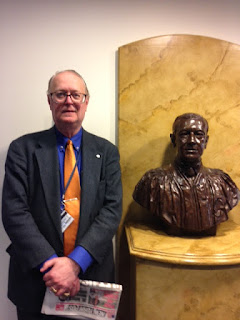Diplomat James (Jim) Patterson at the Woodrow Wilson Center, Ronald Reagan Building and International Trade Center, Washington DC.
Lecture: Iran Hostage Crisis 40th Anniversary Panel Discussion
Woodrow Wilson Center, Ronald Reagan Building and International
Trade Center, Washington DC Oct. 31, 2019
Panelists:
Bruce Riedel, Senior Fellow and Director of the Brookings
Intelligence Project and a Senior Fellow at the Center for Middle East Policy.
Dr. Suzanne Maloney, Deputy Director of the Foreign Policy
Program at the Brookings Institution and a Senior Fellow in the Brookings
Center for Middle East Policy.
Malcolm Byrne, Deputy Director and Research Director at the National
Security Archive.
Moderator: Haleh Esfandiari, Wilson Center.
Reporter: James Patterson, former U.S. diplomat, life member
American Foreign Service Association and member Society for Historians of
American Foreign Relations.
Background: On November 4, 1979, Iranian students
charged the U.S. Embassy Tehran and took hostage 52 American diplomats
and citizens. For Iranian, the crisis was hailed as an act to stem U.S. subversion
of the Iranian Revolution. U.S. President Jimmy Carter called it a terrorist act. The resulting diplomatic standoff lasted 444
days and damaged the institution of the U.S. presidency and the U.S. global
reputation.
The rift in U.S.-Iranian relations deepened after multiple
negotiations failed to win freedom for he Americans. On January 19, 1981, the U.S.
and Iranian governments signed the Algiers Accords, which resolved the crisis. All Americans
were released on Jan. 20, 1981 after the inauguration of President Ronald
Reagan, who campaigned on possibly using the U.S. military to free the hostages.
Now, 40 years later, the Iran Hostage Crisis is a defining moment in U.S.-Iranian relations. To mark the
anniversary of this important chapter in American Foreign Relations history, a
panel discussed how the Crisis is viewed today and how it continues to play a
role in U.S. foreign policy.
Summary: Byrne cited three reasons for the Iranian hostage
crisis: (1) S.Res.164 — 96th Congress (1979-1980) detailing Iran's human rights abuses. Iran singled out Jewish New York Senator Jacob Javits and claimed the
U.S. and Israel were lying and interfering in their internal affairs. (2) The deposed Shah
of Iran entered the U.S. for cancer treatment in October 1979. Ambassador Bruce
Laingen wrote if the Shah was allowed entry to the U.S. it would have serious
consequences to U.S.-Iran relations. On October 20, 1979, President Carter
allowed the Shah entry urged, Byrne said, by "[former Secretary of State Dr.] Henry Kissinger and the Rockefellers." (Editor note:
Interestingly, Byrne cited only Republicans as favoring the Shah entering
the U.S. Later, Byrne said they did Carter and the Nation a great disservice
for pleading on behalf of the Shah.) Finally, an “infamous” meeting between President Carter’s National
Security Advisor Zbigniew Brzezinski (1977-1981) and Iran’s revolutionary
counterpart which elevated the international importance of the Revolutionaries as
official leaders of Iran. Many foreign policy historians consider this a huge diplomatic mistake.
Byrne mentioned the 2012 US film “Argo,” set in Tehran during
the hostage crisis when several Americans, who were not in the U.S. embassy
when it was stormed, escaped with help of Canadian diplomats and film crew. I
asked him if he considered the film’s message to be accurate. He implied it played with the facts and Riedel agreed. Film also falsely dramatized CIA involvement
in Iran. Riedel said the film's final chase scene never happened and the 'film crew" sailed through the airport to safety.
Maloney gave historical perspective on Iran’s internal
politics and the Iranian impressions of the U.S. and its relations with the Shah without regard to the Iranian people. (Editor note: This view despite the
aforementioned S. Res. on human rights abuses in Iran.)
Riedel acknowledged that Ronald Reagan was elected President
of the United States due to the Iran hostage crisis and the national image that
the U.S. was helplessly adrift. (Ed note; Carter had a great Secretary of State
Cy Vance, but Brzezinski had greater control of Carter. The Vance- Brzezinski
debate conflicted Carter for months and caused U.S. inaction and projected an image of U.S. as powerless in the world.)
Riedel said Reagan used psychology to influence Iran to
release the hostages. Iranians called Reagan a “fascist cowboy.” It appeared to
Iran that Reagan, unlike Carter, would eagerly take military action to release
the hostages. Further, Iran had gotten “everything
it wanted diplomatically” from the U.S. in the Algiers Accords which ended
economic sanctions and resumed trade. Thus, Iran no longer had an incentive to hold
the Americans hostage and released them in Jan. 1979. President Reagan dispatched former President Carter to greet
the Americans in Germany.
In conclusion: This was
an excellent panel discussion on an important and policy making historical chapter
in American Foreign Relations History. The Iran Hostage Crisis led President
Carter to make The Carter Doctrine, a policy he proclaimed in his State of the Union
Address on January 23, 1980, which stated that the United States would use
military force, if necessary, to defend its national interests in the Persian
Gulf. Since then the U.S. military presence in the Persian Gulf has
dramatically increased.
-30-

No comments:
Post a Comment